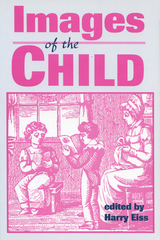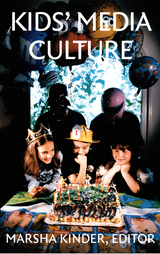
This collection of articles on images of the child offers an excellent range of perspectives on an equally wide range of concerns, including advertising, girls' book series, rap music, realistic fiction, games, dolls, violence, and movies. Taken together as a book, this collection confirms the complexity of the world of childhood, and demonstrates how strongly images of the child reflect the entire culture.

As part of their argument that children’s reactions to mass media are far more complex and dynamic than previously thought, contributors examine the rise of mass media in postwar America. They explore how books, cartoons, and television shows of the 1950s and 1960s—such as Lassie and Dennis the Menace—helped redefine American identity and export an image of a particularly American optimism and innocence worldwide. Other essays take up the controversies surrounding such shows as Sesame Street, My So-Called Life, and Mighty Morphin Power Rangers. After discussing the differences in how children and adults react to such programs, the collection focuses on television in schools and the ways that mass media convey messages about gender and socialization.
Kids’ Media Culture makes clear that children are active, engaged participants in the media culture surrounding them. This volume will be compelling reading for those interested in television and cultural studies as well as anyone interested in children’s education and welfare.
Contributors. Heather Gilmour, Sean Griffin, Heather Hendershot, Henry Jenkins, Yasmin B. Kafai, Jyotsna Kapur, Marsha Kinder, Susan Murray, Elissa Rashkin, Ellen Seiter, Lynn Spigel, Karen Orr Vered

Video games, television, and computers are facts of life for today's children. Anxious parents and teachers, concerned with maintaining the intellectual and social richness of childhood, need to understand their effects. Are we producing a generation of passive children who can't read, who require constant visual and aural stimulation, and who prefer the company of technical instruments to friends and family?
Greenfield believes that to answer this question we should not cling to old and elitist assumptions about the value of literacy. Instead she urges that we explore the results of the new research to discover how the various media can be used to promote social growth and thinking skills. She finds that each medium can make a contribution to development, that each has strengths and weaknesses, and that the ideal childhood environment includes a multimedia approach to learning.
Current studies show us, for example, that television may indeed hinder reading ability under some circumstances. Yet it may also be used to enhance and motivate reading. Television can foster visual literacy, teaching children how to interpret close-ups, zooms, and cutting, and beyond this, how to pick up visual details, orient oneself in space, and anticipate formats and patterns of behavior. Video games teach spatial skills and inductive thinking, and classroom computers, contrary to the popular stereotype, encourage cooperative enterprise.
Timely and optimistic, Mind and Media is filled with unexpected conclusions and practical suggestions for helping our children to thrive in a technological world.
READERS
Browse our collection.
PUBLISHERS
See BiblioVault's publisher services.
STUDENT SERVICES
Files for college accessibility offices.
UChicago Accessibility Resources
home | accessibility | search | about | contact us
BiblioVault ® 2001 - 2024
The University of Chicago Press









